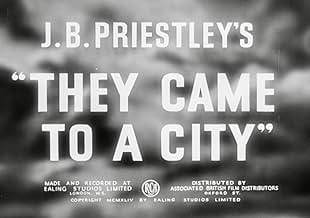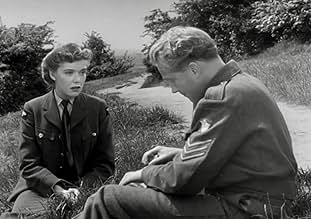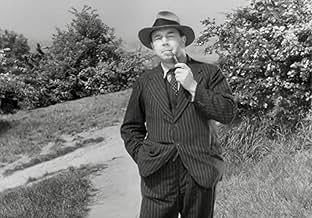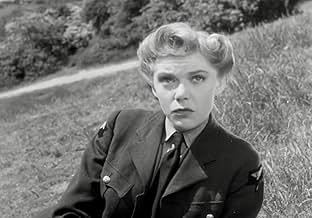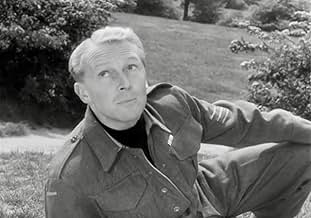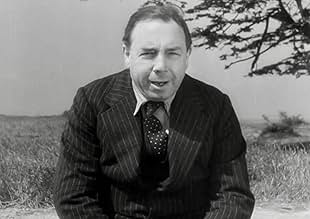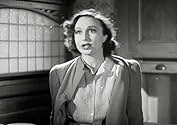अपनी भाषा में प्लॉट जोड़ेंAdapted from a J.B. Priestley play with many of the original actors. The tale of various people who have come to live in an "ideal" city and their hopes and reasons for doing so.Adapted from a J.B. Priestley play with many of the original actors. The tale of various people who have come to live in an "ideal" city and their hopes and reasons for doing so.Adapted from a J.B. Priestley play with many of the original actors. The tale of various people who have come to live in an "ideal" city and their hopes and reasons for doing so.
Mabel Terry-Lewis
- Lady Loxfield
- (as Mabel Terry Lewis)
Fanny Rowe
- Philippa Loxfield
- (as Frances Rowe)
Brenda Bruce
- WAAF
- (बिना क्रेडिट के)
Ralph Michael
- Sergeant Jimmy
- (बिना क्रेडिट के)
J.B. Priestley
- J.B. Priestley
- (बिना क्रेडिट के)
Johnnie Schofield
- Bert the Barman
- (बिना क्रेडिट के)
फ़ीचर्ड समीक्षाएं
The main title actually says 'J. B. Priestley's They Came to a City', and the film constitutes the second of three brief wartime flirtations with fantasy by Ealing Studios.
Coming late in the war when enlightened opinion was already contemplating what was to come next, the ideals it expressed had already found voice in the Boulting Brothers short 'Dawn Guard' and thematically owed a lot to Sutton Vane's 'Outward Bound', James Hilton's 'Lost Horizon' and Priestley's own 1937 fantasy 'I Have Been Here Before'; while the striking production design seems to show the influence of German silent cinema.
Beginning and ending with the genial figure of Mr Priestley ambling on and off, it's not for all tastes, but is certainly quite unlike any other British film before or after.
Coming late in the war when enlightened opinion was already contemplating what was to come next, the ideals it expressed had already found voice in the Boulting Brothers short 'Dawn Guard' and thematically owed a lot to Sutton Vane's 'Outward Bound', James Hilton's 'Lost Horizon' and Priestley's own 1937 fantasy 'I Have Been Here Before'; while the striking production design seems to show the influence of German silent cinema.
Beginning and ending with the genial figure of Mr Priestley ambling on and off, it's not for all tastes, but is certainly quite unlike any other British film before or after.
A British drama; A story about how people might live if they were presented with the opportunity to live in a utopia, an "ideal" city, exploring their hopes and reasons for doing so. This is an eloquent, stagy allegory based on a play of the same title by J. B. Priestley. The direction, acting, and photography are all good, apart from occasional fits of overcooked melodrama within its bounds. It is an intelligent screenplay, but the tale within it lacks cinematic dimension with long, static sequences of dialogue; the audience is robbed of the pictorial element of what is hinted at about the mysterious settlement. Tied to this is a quite heavy political slant in the script, which is left for the viewer to accept as a task rather than for them to explore by diversion; the audience is locked out. Though the theme of universal friendship is explored well.
Lovely piece about assorted people who discovered a happy land far far away - and some found it happier than others. But as noted elsewhere, the Utopia is portrayed without any explanation of how we got there. As another reviewer says, it captured the mood of the times. That mood produced the Attlee government - and after six years of it, it took another 13 before Labour got in again - and Harold Wilson had the sense not to promise Utopia. Unfortunately, The comparison with Lost Horizon is very apt, but Shangri-La doesn't work without it's supernatural elements - which unfortunately we don't possess.,
A very pleasant surprise. This is an allegory about an imagined socialist paradise, and the judgements that various archetypical citizens would have of it. I Loved it.
It happens that I watched this - on FUBI - on the same night that I watched a documentary about Jane Jacobs, the sociologist of cities and advocate of bottom-up community building. This was a perfect follow up.
It's presented as a series of exchanges between the disparate characters, contrasting their values, experience and social orientation. While it could be criticized as didactic and predictable, I found it well executed and fun. I especially loved Googie Withers as the working class gal whose been around the block a few times but isn't ready to go cynical.
In tone and flavor it's like a blend of Capra with Powell & Pressburger.
It happens that I watched this - on FUBI - on the same night that I watched a documentary about Jane Jacobs, the sociologist of cities and advocate of bottom-up community building. This was a perfect follow up.
It's presented as a series of exchanges between the disparate characters, contrasting their values, experience and social orientation. While it could be criticized as didactic and predictable, I found it well executed and fun. I especially loved Googie Withers as the working class gal whose been around the block a few times but isn't ready to go cynical.
In tone and flavor it's like a blend of Capra with Powell & Pressburger.
I usually enjoy malcolmgsw's reviews but this time we have to agree to differ: I consider this, far from being the worst British film, rather amongst the best. Of course, it depends upon what one considers important, how one views our history and the changes in politics. Not long ago, millions of Brits had a vision of a better and more just way of managing things and hopes for a better life for all. This film may have helped the Attlee government gain power the next year, but now all is lost and gone since Clause 4 was thrown out in 1995. The present generation is unhappy but doesn't seem interested in the hopes which this film is concerned with. The acting and the lighting effects are powerful, so it really wouldn't do to sit with one's eyes shut. Of course, if you're hoping for light entertainment and giggles, this film is not for you. It ought to be mentioned that the verse of poetry is taken slightly out of context: 'I dreamed that was the new city of Friends' with a capital 'F', meaning Quakers. It was about the hopes for the founding of Philadelphia in 1681. When a child, Walt Whitman was deeply influenced by a powerful Quaker preacher, and it shows in verses such as this. I can't imagine Whitman would mind his words being applied to this story.
क्या आपको पता है
- ट्रिवियाFinal film of Mabel Terry-Lewis.
- भाव
Alice Foster: I never thought there *could* be a place as good as this.
- कनेक्शनFeatured in Sosialismi (2014)
- साउंडट्रैकMusic selected from The Divine Poem
Music by Aleksandr Skryabin (as Scriabin)
Played by The London Philharmonic Orchestra
Conducted by Ernest Irving
टॉप पसंद
रेटिंग देने के लिए साइन-इन करें और वैयक्तिकृत सुझावों के लिए वॉचलिस्ट करें
विवरण
- चलने की अवधि
- 1 घं 18 मि(78 min)
- रंग
- पक्ष अनुपात
- 1.37 : 1
इस पेज में योगदान दें
किसी बदलाव का सुझाव दें या अनुपलब्ध कॉन्टेंट जोड़ें

